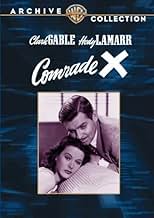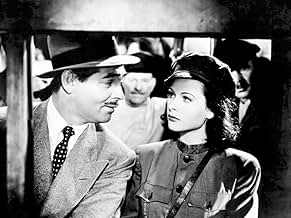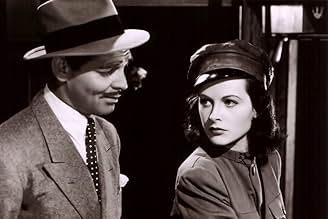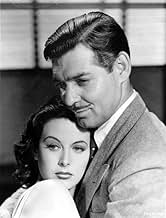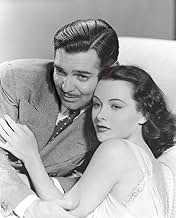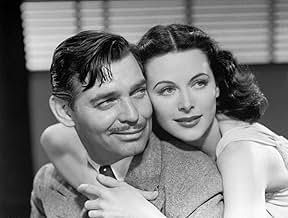PUNTUACIÓN EN IMDb
6,5/10
1,9 mil
TU PUNTUACIÓN
Un reportero estadounidense que saca noticias de contrabando del Moscú soviético es chantajeado para que ayude a una bella comunista a abandonar el país.Un reportero estadounidense que saca noticias de contrabando del Moscú soviético es chantajeado para que ayude a una bella comunista a abandonar el país.Un reportero estadounidense que saca noticias de contrabando del Moscú soviético es chantajeado para que ayude a una bella comunista a abandonar el país.
- Nominado para 1 premio Óscar
- 1 nominación en total
Sig Ruman
- Emil Von Hofer
- (as Sig Rumann)
Georges Renavent
- Laszlo
- (as George Renevant)
Ed Agresti
- Press Correspondent
- (sin acreditar)
Alexander Asro
- Russian Waiter
- (sin acreditar)
William Bailey
- Press Correspondent
- (sin acreditar)
Al Bain
- Marriage Bureau Customer
- (sin acreditar)
Lici Balla
- Russian Woman
- (sin acreditar)
Leon Belasco
- Comrade Baronoff - Hotel Manager
- (sin acreditar)
John Bleifer
- Russian Marriage License Clerk
- (sin acreditar)
- …
Argumento
¿Sabías que...?
- CuriosidadesAt the time this film was released in 1940, World War II had already begun in Europe, but the Soviet Union still had a non-aggression pact with Nazi Germany. In the film, Mac is able to fool a character by pretending to hear news that Germany has broken the pact and launched an invasion of the USSR. That's exactly what happened the very next year when Germany launched Operation Barbarossa in summer 1941.
- PifiasThe script makes reference to the Soviet law that a person could divorce his or her spouse simply by sending them a postcard announcing that the marriage was over. But in 1936, four years before this film was made, Stalin had repealed that law when he rewrote the Russian constitution and made divorces considerably harder to get.
- Créditos adicionales"RUSSIA. The never never land of steppes, samovars and spies -- beards, bears, bombs and borscht - where almost anything can happen - and usually does. "
- ConexionesFeatured in The Miracle of Sound (1940)
- Banda sonoraFuniculi, Funicula
(1880) (uncredited)
Lyrics by Peppino Turco
Music by Luigi Denza
Sung a cappella with modified lyrics by Clark Gable
Reseña destacada
Ernst Lubtisch's classic comic statement about Communist Russia, NINOTCHKA, came out in 1939. Whether it "influenced" the production (also by MGM) of COMRADE X or not I could not say. Certainly there are similarities between the comedies. Lubitsch set his comedy in Paris, where a Communist trade mission is living it up, being corrupted by an émigré Russian noble (Melvin Douglas) so he can try to retrieve jewelry that the trade mission is using as collateral. The Russian government does not trust the three men sent, so they send a fiercer ideologue (Greta Garbo in the title role) who starts straightening out the mission, until she falls for Douglas's charm. In the end she is lured back (with her three associates) to the west and away from the Soviet paradise.
NINOTCHKA had Felix Bressart and Sig Ruman in the cast as two of the members of the trade mission. Comments on this thread point out that in the 1930s "accents" were fairly interchangeable in Hollywood, so that the Swedish Garbo (and later the Austrian Lamarr) became Russian. So did German Ruman and German - Jewish Bressart (who would also play a Hungarian in THE SHOP AROUND THE CORNER).
Unlike NINOTCHKA, COMRADE X is set inside that nightmare land, Stalinist Russia. Somebody is sending out unofficial (but thoroughly correct) news stories showing the crimes being committed in Russian by the government against the people (i.e. the purges), as well as the idiotic projects and waste mismanagement illustrative of how poorly the government is as effective government. This is being resented by the Presidium, who is represented by Oscar Homlolka (Commissar Vasiliev). Please note that Homolka's make-up makes him look a tremendous bit like one Joseph Stalin. At a public funeral covered by the press court, someone tries to shoot Vasiliev (who does all he can to hide the assassination plot). Mac Thompson (Clark Gable), the American reporter, manages to snap a photo of an odd site - a bearded man who a moment before the shooting opened up the lid of the coffin and popped out. This bearded gentlemen turns out to be one Michael Bastakoff (Vladimir Sokoloff), a rival of Vasiliev for power. He is made to look a tremendous bit like one Leon Trotsky.
Get the message from Hollywood here? Vasiliev's agents have been trying to pin down the news leaks, and has narrowed it to two figures: Thompson, and one Emil Von Hofer (Sig Ruman) who is the news representative from Nazi Germany. Ruman manages to demonstrate it ain't him, so (despite Gable's breezy denials) Vasiliev believes it is the American.
Gable has a close friend in Moscow, one Ygor Yahupitz (Felix Bressart) who is his sometimes valet. Ygor's daughter is Galubcha (Hedy Lamarr) who is a streetcar operator. Ygor wants Gable to try to smuggle Galubcha out of the Soviet Union into the U.S. And the film shows (among other things, including overcoming Galubcha's fierce belief in the Communist ideal) Gable eventually saving both the girl and her father.
The comedy is quite amusing, even if it lacks the style and grace of the Lubitsch touch of the first film. But it certainly comments on the atmosphere within Russia in a way that NINOTCHKA failed to do so. The centering of the comedy in Moscow, the suggestiveness of a Stalin - Trotsky rivalry clone, and the heavy control over information is certainly more realistic than Douglas' being elegant and eloquent about the beauties of Paris.
One more thing to keep in mind is a scandal which is on target with this film, and which (in 1940) finally began to raise eyebrows. In the early 1930s the New York Times had a reporter named Walter Duranty in Moscow. He turned out to be a fantastically well informed reporter in the Soviet Union, and came out with interviews and articles that were tremendously informative. In fact, he would win the Pulitzer Prize for his reporting from Moscow. But as time passed, Duranty's methods and sources were heavily questioned. He also tended to take an official line about the Purge Trials (i.e., that Bukhanin, Radek, Zinoviev, Tuchochevsky, and the other hundreds and thousands of victims were all actual traitors against the Stalinist regime). After the signing of the non-aggression pact with Germany in 1939, the Times became very suspicious of Duranty, and replaced him. The quality of the articles became very much more even handed. Duranty was later revealed to be a Stalinist agent. Interestingly enough, the Pulitzer Committee has repeatedly rejected requests to take back their award from Duranty's heirs as his work was pure propaganda. So the issue about the control over the news from Russia was very, very real.
NINOTCHKA had Felix Bressart and Sig Ruman in the cast as two of the members of the trade mission. Comments on this thread point out that in the 1930s "accents" were fairly interchangeable in Hollywood, so that the Swedish Garbo (and later the Austrian Lamarr) became Russian. So did German Ruman and German - Jewish Bressart (who would also play a Hungarian in THE SHOP AROUND THE CORNER).
Unlike NINOTCHKA, COMRADE X is set inside that nightmare land, Stalinist Russia. Somebody is sending out unofficial (but thoroughly correct) news stories showing the crimes being committed in Russian by the government against the people (i.e. the purges), as well as the idiotic projects and waste mismanagement illustrative of how poorly the government is as effective government. This is being resented by the Presidium, who is represented by Oscar Homlolka (Commissar Vasiliev). Please note that Homolka's make-up makes him look a tremendous bit like one Joseph Stalin. At a public funeral covered by the press court, someone tries to shoot Vasiliev (who does all he can to hide the assassination plot). Mac Thompson (Clark Gable), the American reporter, manages to snap a photo of an odd site - a bearded man who a moment before the shooting opened up the lid of the coffin and popped out. This bearded gentlemen turns out to be one Michael Bastakoff (Vladimir Sokoloff), a rival of Vasiliev for power. He is made to look a tremendous bit like one Leon Trotsky.
Get the message from Hollywood here? Vasiliev's agents have been trying to pin down the news leaks, and has narrowed it to two figures: Thompson, and one Emil Von Hofer (Sig Ruman) who is the news representative from Nazi Germany. Ruman manages to demonstrate it ain't him, so (despite Gable's breezy denials) Vasiliev believes it is the American.
Gable has a close friend in Moscow, one Ygor Yahupitz (Felix Bressart) who is his sometimes valet. Ygor's daughter is Galubcha (Hedy Lamarr) who is a streetcar operator. Ygor wants Gable to try to smuggle Galubcha out of the Soviet Union into the U.S. And the film shows (among other things, including overcoming Galubcha's fierce belief in the Communist ideal) Gable eventually saving both the girl and her father.
The comedy is quite amusing, even if it lacks the style and grace of the Lubitsch touch of the first film. But it certainly comments on the atmosphere within Russia in a way that NINOTCHKA failed to do so. The centering of the comedy in Moscow, the suggestiveness of a Stalin - Trotsky rivalry clone, and the heavy control over information is certainly more realistic than Douglas' being elegant and eloquent about the beauties of Paris.
One more thing to keep in mind is a scandal which is on target with this film, and which (in 1940) finally began to raise eyebrows. In the early 1930s the New York Times had a reporter named Walter Duranty in Moscow. He turned out to be a fantastically well informed reporter in the Soviet Union, and came out with interviews and articles that were tremendously informative. In fact, he would win the Pulitzer Prize for his reporting from Moscow. But as time passed, Duranty's methods and sources were heavily questioned. He also tended to take an official line about the Purge Trials (i.e., that Bukhanin, Radek, Zinoviev, Tuchochevsky, and the other hundreds and thousands of victims were all actual traitors against the Stalinist regime). After the signing of the non-aggression pact with Germany in 1939, the Times became very suspicious of Duranty, and replaced him. The quality of the articles became very much more even handed. Duranty was later revealed to be a Stalinist agent. Interestingly enough, the Pulitzer Committee has repeatedly rejected requests to take back their award from Duranty's heirs as his work was pure propaganda. So the issue about the control over the news from Russia was very, very real.
- theowinthrop
- 12 ago 2006
- Enlace permanente
Selecciones populares
Inicia sesión para calificar y añadir a tu lista para recibir recomendaciones personalizadas
- How long is Comrade X?Con tecnología de Alexa
Detalles
- Duración1 hora 44 minutos
- Color
- Relación de aspecto
- 1.37 : 1
Contribuir a esta página
Sugerir un cambio o añadir el contenido que falta

Principal laguna de datos
By what name was Camarada X (1940) officially released in India in English?
Responde
